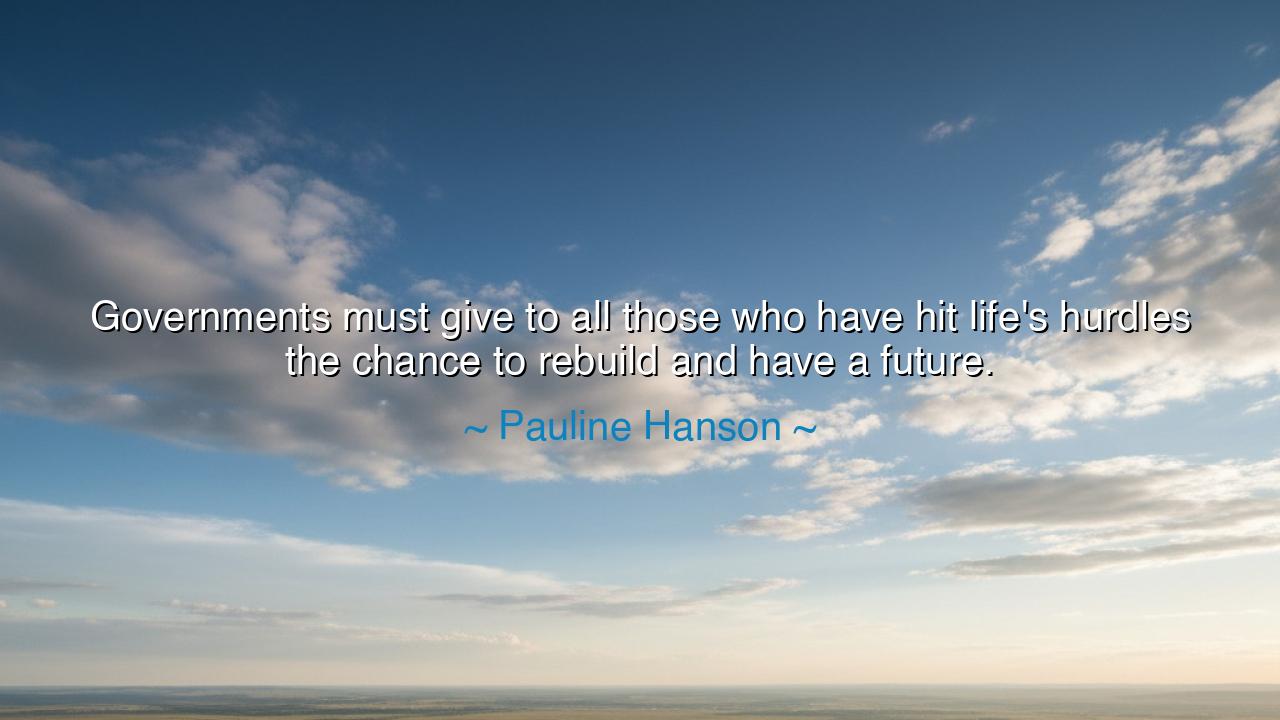
Governments must give to all those who have hit life's hurdles
Governments must give to all those who have hit life's hurdles the chance to rebuild and have a future.






In the great unfolding of the human journey, there are many who find themselves broken by life’s unyielding trials. The winds of misfortune may blow fiercely, leaving in their wake those who stumble and fall—unable to find their footing amidst the rubble of their struggles. And yet, in these moments of despair, there arises a deep, innate truth, a powerful call to action that echoes through time, spoken by Pauline Hanson: "Governments must give to all those who have hit life's hurdles the chance to rebuild and have a future." These words, simple yet profound, remind us of the sacred responsibility that those who govern have—to lift up those who have fallen and to grant them the opportunity to rise again, to rebuild their lives, and to reclaim their future.
This call to compassion and justice is not a new one. It has been voiced by the wise leaders and philosophers throughout the ages, who have understood that a society’s true strength lies not in the riches of the powerful, but in the care it shows to the most vulnerable. In ancient Greece, Plato wrote of the ideal state, where the rulers were entrusted not with wealth, but with the duty of ensuring that all individuals, regardless of their station in life, were given the opportunity to flourish. The state, he believed, had a responsibility to rebuild the lives of those who had fallen, to offer them a future filled with hope and possibility. This wisdom transcends time, and Hanson’s words resonate with the same truth: it is only when a society invests in the future of all its members that it can truly call itself just and strong.
Consider the story of Nelson Mandela, a man who knew well the bitter taste of life's harshest hurdles. Imprisoned for 27 years, Mandela faced not just the physical hardships of confinement, but the emotional and spiritual toll of losing his freedom, his family, and his connection to his people. Yet, in the midst of his suffering, Mandela never lost hope in the future. When he was released from prison, he did not seek vengeance against those who had wronged him. Instead, he sought reconciliation and healing, working to rebuild a divided nation. His leadership demonstrated that even the greatest of struggles could be transformed into a foundation for future unity and hope. Just as Hanson suggests, Mandela’s country had to give those who had hit life’s hurdles the chance to rebuild—not just physically, but emotionally and spiritually.
The wisdom of Hanson's statement echoes that of the ancient Romans, who understood that a society’s greatness could not be measured by the strength of its legions or the wealth of its emperors, but by the strength of its social fabric—by the care it gave to the fallen and the marginalized. The Roman practice of pax romana, or "Roman peace," was not only about the suppression of war, but about creating a society in which people, even those who had been conquered, had the opportunity to rebuild their lives. Just as the Romans were great in their conquests, they were also wise in their understanding that a prosperous society must provide the conditions for all to flourish, especially those who have faced life’s greatest challenges.
In the modern world, we see that governments still carry this sacred responsibility to uplift and rebuild. When individuals face economic hardship, personal loss, or social exclusion, the role of the state is to provide them with the tools to rise again. We see this in the creation of social welfare programs, education systems, and mental health support—institutions that help those who have stumbled find their way forward. Just as Mandela helped lead his country to peace after years of apartheid, so too must the governments of today extend the hand of compassion to those who face the struggles of life. This is the work of true leadership—to offer the fallen the opportunity to rebuild, to regain their strength, and to build a brighter future for themselves and for their communities.
So, the lesson we must take from Pauline Hanson’s words is one of compassionate action. If we are to be part of a society that is truly just, we must ensure that those who have faced adversity are given the resources, the support, and the opportunity to rebuild their lives. This means advocating for policies that focus on rehabilitation, education, and community support. It means standing with those who are struggling, recognizing that their pain is not a reflection of their worth, but a reflection of the difficulties life has thrown their way. We must be the ones to extend the hand of hope, offering not just charity, but the tools to rebuild, to create a future full of promise.
In your own life, remember the power of compassion and support. When you encounter someone who has fallen, whether in spirit, circumstance, or health, do not turn away. Instead, be the one to offer the chance to rebuild, the chance to start anew. Whether through a kind word, a gesture of support, or advocating for those in need, you, too, can play a part in helping others find their way. It is in this act of rebuilding together that we not only heal the individual, but strengthen the very fabric of our society. For in each of us lies the power to offer the chance to rebuild and a future filled with hope and promise.






AAdministratorAdministrator
Welcome, honored guests. Please leave a comment, we will respond soon